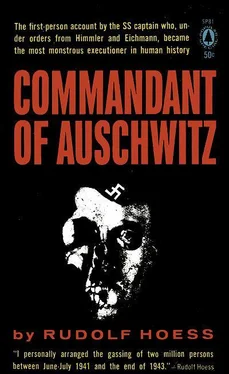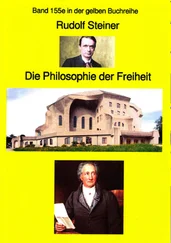In contrast to the narrow-mindedness which Eicke displayed in all matters relating to the concentration camps, he showed an unprecedented liberality in all that concerned the troops. The strengthening of the Death’s Head formations had become his main preoccupation. The concentration camps with their “enemies of the state” were for him only a means to an end.
At later budget conferences he constantly produced overwhelming arguments concerning the danger represented by the “enemies of the state” and the consequent necessity for increasing the strength of the guards.
The new barracks, which were under construction, were never big enough or spacious enough for him. The furnishings were never comfortable enough. For every bit of space that was saved in the concentration camp, the troops were given ten times as much in return. He had to square matters with Pohl in order to get the necessary money for furnishing the troops’ quarters.
Eicke had no knowledge of human nature and time and again he allowed himself to be deceived by appearances and clever talk by men who knew how to make themselves seem skillful and adept, and he trusted these individuals far too much. His opinions of people were apt to be colored by chance events or by his moods. If an SS officer had got himself disliked, or if Eicke, for some reason or other, could not tolerate him, then it was best for that officer to arrange to be transferred from Eicke’s service as rapidly as possible.
Any officers or Junior officers (he hoped to bring the men around to his way of thinking) whom he considered unsuitable for service with the troops would either be removed from his command or (after 1937 when, at his instigation, the troops and the concentration camps were separated from each other) transferred to a post in a concentration camp. As a result, the commandants’ staffs were gradually filled with incapable officers and junior officers, whom Eicke did not want to get rid of completely because of the length of time during which they had been a member of the Party or of the SS. The camp commandants would have to worry about them. They were constantly transferred in an effort to find them a suitable post and most of them eventually found their way to Auschwitz, which gradually became used by the Inspector of Concentration Camps as a dumping ground for discarded personnel. If Eicke had only removed these incapable officers entirely out of his command, the concentration camps would later on have been spared a great deal of unpleasantness and brutality. The effects of Eicke’s philosophy were to continue to make themselves felt for many years.
It can be ascribed to Eicke’s ignorance of human nature that camp commandants such as Koch and Loritz possessed his complete confidence, which could not be displaced even by the most disagreeable incidents. They were allowed to do as they pleased in their camps.
He indulged them in every respect and never interfered with them, even though he was fully informed about all that went on.
After the separation of the troops from the concentration camps, Eicke no longer took such an active interest in the latter as he had previously done. His main preoccupation was with the troops. The work in connection with the expansion of the camps was done on his authority, but he was concerned only with the outside appearances and no longer worried about the internal arrangements. He remained stuck in his ideas about “enemies of the state,” but he was now out of date. Only about 10 per cent of the inmates of the concentration camps were political prisoners, the rest being professional criminals, asocials, and so on. Eicke’s later orders and regulations on matters concerning the prisoners were made at his desk and were still based on his Dachau experiences and opinions. He made no more innovations or upheavals. In spite of his inexhaustible capacity for work and his resilience, and in spite of his perpetual urge for improvements and reforms, he had nothing to offer to the concentration camps. His energies were directed toward the troops. His position as Inspector of Concentration Camps was purely nominal.
When German troops marched into the Sudetenland, Eicke was with the Upper Bavarian Death’s Head formation, as the guard regiment at Dachau was later named. The 4th Regiment assisted in the occupation of Danzig. Isolated units of the Death’s Head formation also took part in the Polish campaign. After the campaign Eicke received orders from the Führer to form the Death’s Head Division as speedily as possible. He himself was created Lieutenant General.
At the beginning of the war all the front-line Death’s Head units in the camps were replaced by reservists from the General SS. This was also tried as a temporary expedient during the occupation of Czechoslovakia. It gave rise to many difficulties, since the veteran reservists had no knowledge whatever about guarding prisoners, and many of them were physically unsuited to the arduous requirements of the service. The professional criminals quickly took advantage of many of them and used them to abet their escape or for similar delinquencies.
Dachau concentration camp was evacuated to enable the Death’s Head Division to be formed, and the prisoners were transferred to Flossenburg and Mauthausen. After F Division had been formed and marched off to the training ground, the prisoners were brought back.
While the division was being formed, Brigadeführer Glücks, who up till then had been chief of staff to the Inspector of Concentration Camps, was appointed Inspector by order of the Reichsführer SS.
The Death’s Head Division first took part in the fighting in France and was then employed in occupation duties on the Spanish frontier, until the campaign against Russia, when it was constantly used where the fighting was fiercest. They were several times encircled, as at Demiansk, and suffered terrible losses.
Eicke’s behavior during the building up of this division was typical.
The army departments used all their endeavors to impede and delay the build-up. First it was to be a motorized division, then a cavalry division, then it was to be a partially motorized division.
With imperturbable calm Eicke watched all this happening and stole for himself, whenever he could, the weapons and equipment he required. In this way he collected all his heavy artillery from transports destined for Romania.
The training of active service guards into tough soldiers now began to bear fruit.
The achievements of the Death’s Head Division were only made possible because of the ironclad training which Eicke had given the troops, and because of the affection which they had for Eicke himself.
In the spring of 1942 he was shot down during a reconnaissance flight near Kharkov, while he was searching for a tank company commanded by his son-in-law. All that was found of him was a piece of his uniform, with the Knight’s Cross with Oak Leaves and Swords.
In this way he met the soldier’s death, which he had sought ever since the time, a short while before, when his only son had also fallen in battle.
The second Inspector of Concentration Camps was SS Gruppenführer Richard Glücks
Glücks originally came from Dusseldorf and had spent several years before the First World War in Argentina. When war broke out he got through the British control by smuggling himself on board a Norwegian ship and eventually reported for military service. He served throughout the war as an artillery officer. After the war he was appointed a liaison officer with the armistice commission, and later on joined a Freikorps in the Ruhr district. Up to the time when Hitler assumed power, he was engaged in business activities.
Читать дальше












